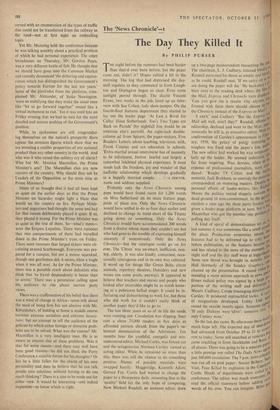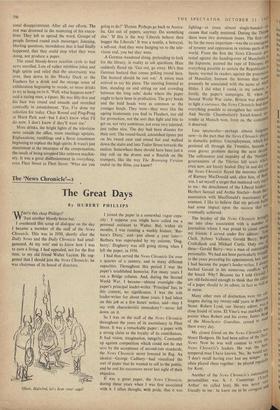The 'News Chronicle'—i
The Day They Killed It
By PHILIP PURSER
THE night before the rumours had been harder than they d ever been before, but the paper came out, didn't it? Hopes rallied a bit in the morning. The fog that had depressed the day- staff regulars as they commuted in from Lough- ton and Orpington began to clear. Even some sunlight peered through. The diarist Vincent Evans, two weeks in the job, lined up an inter- view with Sue Cohen, lady show-jumper. On the fourth-floor features department they started to lay out the leader page 'At Last a Rival for Callas' (Joan Sutherland). 'Jon's Two Types are Back on Parade' (by nightfall Jon would be on someone else's payroll). An eight-inch double- column ad. from Spicers, the paper-makers. Five Readers' Letters, about teaching, television, milk, Frank Cousins and sex education in schools. 'Extra-marital sexual intercourse has of necessity to be infrequent, furtive fearful and largely a somewhat inhibited physical experience. It must needs lack the freedom, joy and wonder of that ineffable relationship which develops gradually in a happily married couple. ,. . .'—A DOCTOR, name and address supplied.
Probably only the News Chronicle among pops would have found room for 1,200 words on Miss Sutherland on its main feature page, pride of place too. Only the News Chronicle would have settled to do so four days earlier and declined to change its mind short of the Titanic going down or something. Only the News Chronicle would have accommodated 200 words from a doctor whose name they couldn't use but who had gone to the trouble of expressing himself sincerely if sententiously. Only the News Chronicle—but the catalogue could go on for ever. The `Chron' was un-smart, inefficient, non- hip, elderly. It was also kindly, concerned, occa- sionally courageous and in its own way cultured. It stood up for things like Green Belts, circus animals, repertory theatres, Outsiders and new waves (on some pools, anyway). It appeared, to believe that teachers and nurses and people who looked after incurables might be as worth know- ing as a pubescent ballad singer. It could be in- furiating and disheartening to work for, but those who did work for it couldn't easily think of another paper they'd like to go to.
The last three years or so of its life the sands were running out. Circulation was slipping. Suez cost a clean 25,000 readers in five days as affronted patriots shrank from the paper's ve- hement denunciation of the Adventure. Ten months later the youthful, energetic and mis- understood editor, Michael Curtis, was forced out and the sexagenarian Norman Cursley named as acting editor. While he remained no more than this, there was still the chance to do something positive. Names of possikole messiahs were swapped hourly : Muggeridge, Kenneth Adam, Gerard Fay. Curtis had wanted to change the paper to a threepenny daily, reasoning that in the 'quality' field lay the only hope of competing. Now Michael Randall, an assistant editor, drew up a two-page memorandum reasserting the cast; The chairman, L. J. Cadbury, listened bleaklY t Randall presented his thesis as simply and blun! as he could. Randall said, if we carry oll are doing the paper will die: He beckoned La'i bury over to the reading desk where the Illcs_ot the Mail, Express and Chronicle were displIV 'Can you give me a reason why anyone cop fronted with these three should choose to the Chronicle instead of the Express or Me 11 1 'I can't,' said Cadbury. 'But the Expre.0 a"he Mail sell well, don't they?' Randall, offered to editorship, declined and went to the Mall. ironically he still is, as executive editor. With o, confirmation of Cursley's appointment in Fe"k;bt ary, 1958, the policy of palely imitating 'd. toughies was fixed and the paper's fate scale it The new editor had worked his way unspecla`rnd larly up the ladder. He seemed indecisive, abe far from inspiring. Wan devices, often at expense of professional journalists, were infra duced: 'Reader TV Critics' and the rac14 motorist, Jack Brabham, to override the m0°,1,, correspondent on motoring matters. Despite 1"pi personal efforts of leader-writers like gic111,10 Moore the politics veered sloppily towards 101 dead ground of non-commitment. In the gene ip election a year ago the three party leaders gent ) given a leader-page platform.in turn, but it °00 Macmillan who got the number one position polling day itself. A kind of spiral of demoralisation set in: 41 last summer it was sometimes like a smell ar°1111 the place. Production economies meant 1,0 features had to be delivered up to sixtY 11;55 before publication, so the features became The and less related to the news of the moment' d5, night staff and the day staff were at loggerhlo Some new blood was brought in, notably rIi. Hall (formerly of the Sunday Graphie)' cleaned up the presentation. A round criltd• manding a more serious approach to news a"nro. firmer radical policy was signed by a large ,Ir to portion of the writing staff and delivered 1.0 Messrs. Cadbury, Coope (managing director) "Iote Cursley. It produced reproachful looks. A lot of resignations developed. Lobby LI° lied, round the seaside resorts again. Someone 'If only Dickens were 'alive': someone else' only Cursley were.' So the last day came. By afternoon there 05011,0 much hope left. The expected day of shut'd°0r. had advanced from October 29 to 21 to t°11,101 row to today. Some still snatched at rumours of came crackling in from Stockholm and Pliria. f, all places. There was going to be a separate Oria a little prestige one called The Daily Nov. sa„gdole just 300,000 circulation. The 5 p.m. news se,lfr,too was run off on pink paper : Soccer Bribery Visit, Four Killed by explosion in the °Pet Castle. Heads of departments were called Rio conference. The editor was much overcorne.010 read the official statement before adding 54. words of his own. You can imagine. Bitter . sonal disappointment. After all our efforts. The rest was drowned in the muttering of his execu- tives. They left to spread the word. Groups' of people formed round each messenger, listening, blurting questions, incredulous that it had finally happened, that they could stop what they were doing, not produce a paper.
The usual bloody-brave reaction cycle to bad news unrolled. Lots of rather mirthless jokes and high spirits and relief that the uncertainty was over, then down to the Mucky Duck or the Feathers for a drink and the strange sense of exhilaration beginning to recede, so more drinks to try to hang on to it. 'Well, what happens now?' said a racing man, a tipster. He was fifty-five and his face was round and smooth and stretched comically in astonishment. 'Yes, I've done my selection for today. Clear Round and Ping-Pong at Hurst Park and—but I don't know what I'll do now. I don't know if they'll want me.'
More drinks, the bright lights of the television news outside the office, more meetings upstairs. Explanations, rumblings and a fierce resentment beginning to replace the high spirits. It wasn't just resentment at the meanness of the compensation,. the insult of being scrapped like outworn machin- ery. It was a great disillusionment in everything, even Fleet Street as Fleet Street. 'What are you going to do?"Dunno. Perhaps go back to Austra- lia. Get out of papers, anyway. Do something else.' If this is the way Liberals behave then bugger the Liberals.' It was a scuttle, a betrayal, a sell-out. And they were hanging on to the tele- vision end, you bet they were.
A German wandered along, pretending to look for the library, in reality to ask questions. Hate suddenly flared up. 'Get out, go away. He's that German bastard that comes poking round here. The bastard should be run out.' A union man arrived to say his piece. The meeting listened to him, standing on and sitting on and crowding between the long subs' desks where the paper ought to have been in prdduction. The grey heads and the bald heads were as common as the younger heads. They were—they were like the ageing lieutenants you find in Flaubert, too old for promotion, not the sort that fight and bite to get on, not very ambitious, not even very talented, just rather nice. The day had been disaster for their sort. The round-faced, astonished tipster put on his tweed coat and tweed 'hat and walked down the stairs and into Tudor Street towards the station. Somewhere there should have been just a tiny roll on the drums and a flourish on the trumpets, like the way The Browning Version ended on the films, you know?



















































 Previous page
Previous page